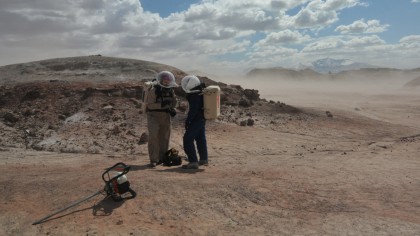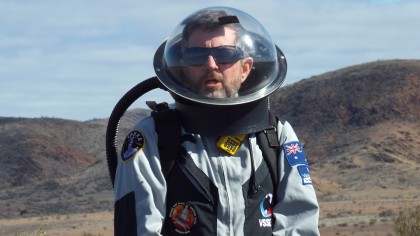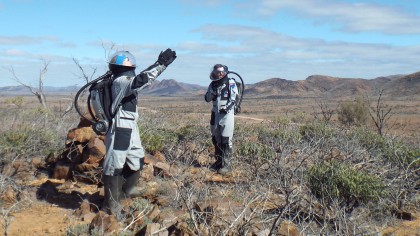What is it really like to shoot a gun on Mars?
We find out, for the good of humanity

Big news: SpaceX just announced that it plans to send its Dragon spacecraft to Mars as early as 2018. It will be an uncrewed mission but one that could help pave the way for putting humans and eventually settlements on the Red Planet.
While we're still a long way off stepping foot on the Martian surface ourselves, Mars has already featured in many works of fiction, from last year's movie The Martian to Bethesda's upcoming game Doom (which is out May 13), the latter of which I am going to try to tentatively tie this feature to.
Mars has been a recurring backdrop to the Doom franchise. In Doom 3 - and the upcoming game - the surface of Mars is portrayed as being much more hospitable; in Doom 3 the planet's gravity was increased to match that of Earth's. But what would it be like to fight on the surface of Mars for real?
We put our curiosities to Jon Clarke, president of the Mars Society, Australia. The Mars Society is a non-profit research organisation made of scientists, engineers and other passionate people who want to further the goal of human exploration on Mars. As well as educating the public, the Mars Society lobbies for more government involvement and funding in space research.
Unmanned spacecrafts have been visiting Mars for the last 40 years, mapping the surface and revealing more about the Red Planet, but how long will it be until humans set foot on it? And - the big question - what's it like to judo throw someone across the Mars desert?

But before I ask all of that, I ask Clarke how easy it's actually going to be for humans to survive on the surface when we get there.
"You would want to use local resources as much as possible," says Clarke. "To live in a technologically advanced environment, which is what you need to do, you need power."
Sign up for breaking news, reviews, opinion, top tech deals, and more.
Solar power would be easy then, but what else? "Even though the atmosphere is very thin, you could potentially generate wind power on Mars," says Clarke. "The other thing is water, which you can process to turn into fuel for your spacecraft, for your vehicles, and of course you can drink it, and you can manufacture oxygen from it."
So, if you can find a water resource and you have an energy resource, you can do pretty much what you want in term of Mars exploration. That will also, in theory, extend to establishing stations and, eventually, settlements.
"In terms of raw materials, there's sand and gravel on the surface that we can use to construct roads," says Clarke. "There may be metals we can use further down the track. And there are clays and soils and all the nutrients that we need for plants so long as we can extract the salt from them, so the plants can grow rather than be poisoned by the salt."
So there's a good chance we can build the basics for survival. After all, Mark Watney/Matt Damon did it easily enough in The Martian and Clarke thinks that's been the most accurate depiction of living on Mars so far.
I like to move it, move it
But once I start forging my best approximation of a settlement out of the raw materials I find, how easy will it be for me to maneuver about, considering the gravity on Mars is about 62% lower than on Earth's?
"If you're in a gym in a Mars habitat, you would jump a lot harder, a lot higher, and a lot further than you could on Earth," says Clarke. "The astronauts on the Moon, they found the best way to walk around the moon was to hop like a rabbit or a kangaroo because gravity was so much lighter." Clarke says that if you think of the speed you walk at on Earth, that would be the equivalent of running on Mars.
But on Mars's surface you're probably going to be encumbered by your space suit, restricting your movements - no good when the demons come charging - however Clarke says you could wear something much less protective and still have no risk of harm.
"Your skin is actually a rather good space suit. You could be exposed to a vacuum with an open weave fabric covering your body - obviously you'll need to wear a pressurised helmet to keep breathing - but in a very thin sort of super spandex or wetsuit-like material, you could actually walk around on Mars a lot easier than you could with current space suits. There are people researching this here in Australia and in the US and Europe. Our spacesuits might not be a Michelin Man kind of affair, but something that better fits your body."

And if your helmet does malfunction then don't panic, you have a bit of time up your sleeve (Mars is not a total vacuum, but it's damn close). In Total Recall, Arnold Schwarzenegger famously became exposed to Mars's elements in an eye-boggling death scene (literally: his eyes protruded from their sockets). In reality it wouldn't be quite as dramatic or as fast. Yup, shock horror, Hollywood sometimes exaggerates.
"If you're exposed to a vacuum, you don't freeze, you don't explode," says Clarke, "You basically pass out from lack of oxygen and if you're not resuscitated within two minutes you will die."
If exposed to Mars's atmosphere without a helmet you'll probably pass out in about 15 seconds, but if you're put back into a pressurised environment in under two minutes you'll be fine, aside from some bloodshot eyes.
"People have been exposed to vacuums. In some cases they have been rescued of time, and can even tell us what it feels like. Apparently the sensation of your saliva boiling in your mouth is very peculiar."
Come at me
So I'm on Mars, I've set up my base, and I know I'm not totally screwed if I become exposed to the elements. What are the chances of meeting any sort of other lifeforms, and should I be prepared for combat?
"Early Mars and early Earth had very very similar conditions," says Clarke "So however life got here, it appeared on the early Earth. It could have also appeared on early Mars as well, and if it didn't, that becomes the interesting question."
The earliest life form would have been microbes, but as Mars became less hospitable, any surviving life would have gone underground. In Doom 3, the ruins of an ancient civilization are discovered on Mars, however, assuming I don't open any gateways to hell, the only life I find will probably be microbes burrowed into mineral grains.
"I don't think there is much chance of finding any evidence of indigenous advanced life on Mars," says Clarke. "Sadly I don't think there are any lost Martian cities. But Mars has been around for four and a half billion years, and in that time who knows.
"Other beings may have travelled from other stars and looked at Mars, and because the martian surface is much older than Earth's surface, it may be possible we'll find artefacts or garbage even left by interstellar visitors that we wouldn't find on Earth."

Say, for the sake of argument, I was faced with a demonic monster on Mars's surface, how would shooting a gun work?
"It wouldn't be as loud because the air is a lot thinner," says Clarke. "The atmospheric pressure is about 1%, so you'd hear a bang but it wouldn't be as loud. Your range would be a lot further because the bullet would drop much more slowly in the Mars gravity."
Nonetheless, it would still do damage. "All sort of projectile weapons would work," explains Clarke. "You would certainly shoot further. So all those weapons would work quite well."
Explosives would work too, but only if you have some oxygen. "So if you wanted to use a flamethrower on Mars you would need some sort of oxygen supply to make it work." Firing a gun still works because the bullet has its own oxygen supply inside it. Explosives have the same - which is why they also work underwater - but any fires caused as a result would very quickly die out without the oxygen to keep them going.
That's good to know, but how would I fare in hand-to-hand combat? "Punching something wouldn't be any different," says Clarke, "but things like judo throws would be different. You would fall more slowly so you'd have more time to react. You can probably throw people further too."
That's because, although I'd weigh less on Mars, my mass would stay the same. If someone threw me over their shoulder, I'd weigh a third of my actual weight. However, my inertia would remain the same, which would take some getting used to. That applies to walking about too: I'd have to take into account for the fact the mass of my spacesuit would be different to how it feels, so best be careful if making and sharp turns.
"We see this on space stations," says Clarke. "When the astronauts first go to the space station and you look at the videos of them they're really quite clumsy, like stranded octopi. But once they've been there for a few months they move through the corridors like fish.
"They realise their weight and they react accordingly. It would be the same on Mars too."
We've established how gunfighting and hand-to-hand combat would probably play out on Mars, but here's what I really want to know: can I troll people on the internet during my expedition to the dusty planet? Turns out, I can - but at a very slow pace. We already have the means to communicate on Mars via space probes, but two-way conversations would still be very drawn out. The shortest distance still takes five minutes to get there, so I'd be waiting five minutes for a reply.
"You would have your own local internet that would update periodically from Earth," says Clarke. "Facebook would even work on Mars but you wouldn't be able to update every five minutes. You might be able to put up a couple of comments every day."
Which means I can be more active on Facebook while on Mars than I currently am on Earth. The wonders of science.

Hugh Langley is the ex-News Editor of TechRadar. He had written for many magazines and websites including Business Insider, The Telegraph, IGN, Gizmodo, Entrepreneur Magazine, WIRED (UK), TrustedReviews, Business Insider Australia, Business Insider India, Business Insider Singapore, Wareable, The Ambient and more.
Hugh is now a correspondent at Business Insider covering Google and Alphabet, and has the unfortunate distinction of accidentally linking the TechRadar homepage to a rival publication.